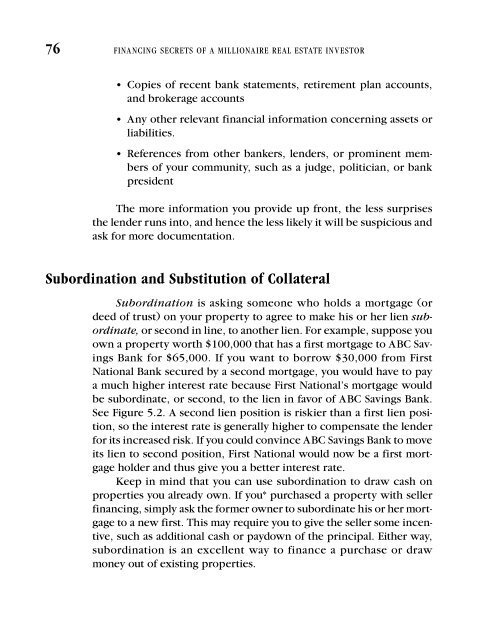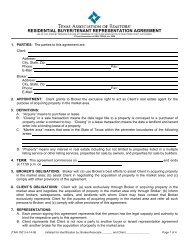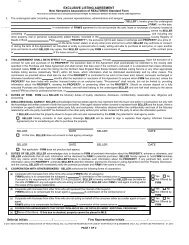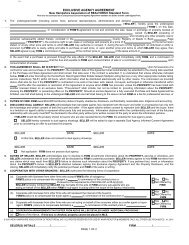financing secrets of a millionaire real estate investor.pdf
financing secrets of a millionaire real estate investor.pdf
financing secrets of a millionaire real estate investor.pdf
Create successful ePaper yourself
Turn your PDF publications into a flip-book with our unique Google optimized e-Paper software.
76 FINANCING SECRETS OF A MILLIONAIRE REAL ESTATE INVESTOR<br />
• Copies <strong>of</strong> recent bank statements, retirement plan accounts,<br />
and brokerage accounts<br />
• Any other relevant financial information concerning assets or<br />
liabilities.<br />
• References from other bankers, lenders, or prominent members<br />
<strong>of</strong> your community, such as a judge, politician, or bank<br />
president<br />
The more information you provide up front, the less surprises<br />
the lender runs into, and hence the less likely it will be suspicious and<br />
ask for more documentation.<br />
Subordination and Substitution <strong>of</strong> Collateral<br />
Subordination is asking someone who holds a mortgage (or<br />
deed <strong>of</strong> trust) on your property to agree to make his or her lien subordinate,<br />
or second in line, to another lien. For example, suppose you<br />
own a property worth $100,000 that has a first mortgage to ABC Savings<br />
Bank for $65,000. If you want to borrow $30,000 from First<br />
National Bank secured by a second mortgage, you would have to pay<br />
a much higher interest rate because First National’s mortgage would<br />
be subordinate, or second, to the lien in favor <strong>of</strong> ABC Savings Bank.<br />
See Figure 5.2. A second lien position is riskier than a first lien position,<br />
so the interest rate is generally higher to compensate the lender<br />
for its increased risk. If you could convince ABC Savings Bank to move<br />
its lien to second position, First National would now be a first mortgage<br />
holder and thus give you a better interest rate.<br />
Keep in mind that you can use subordination to draw cash on<br />
properties you already own. If you* purchased a property with seller<br />
<strong>financing</strong>, simply ask the former owner to subordinate his or her mortgage<br />
to a new first. This may require you to give the seller some incentive,<br />
such as additional cash or paydown <strong>of</strong> the principal. Either way,<br />
subordination is an excellent way to finance a purchase or draw<br />
money out <strong>of</strong> existing properties.










